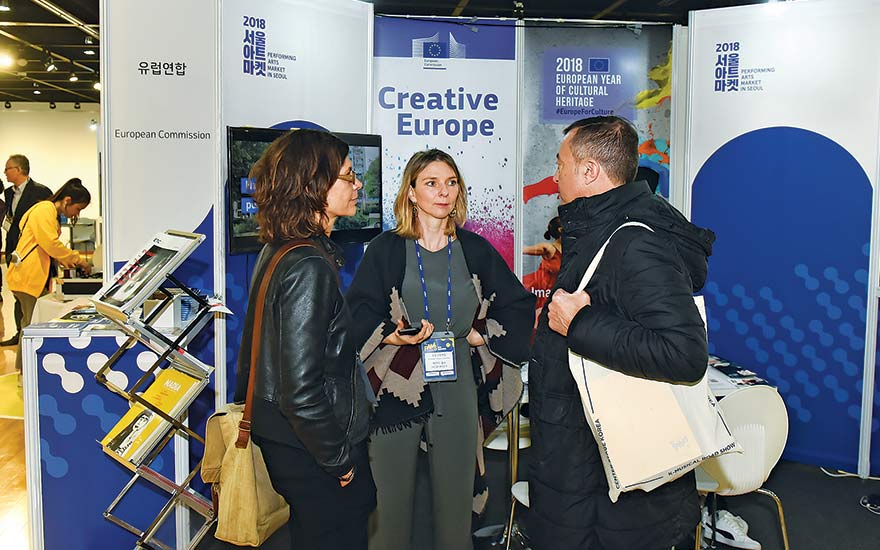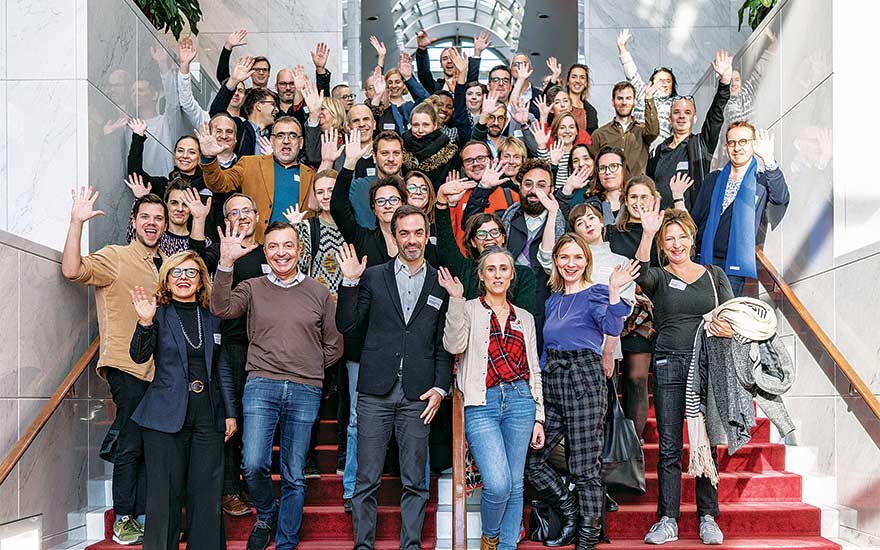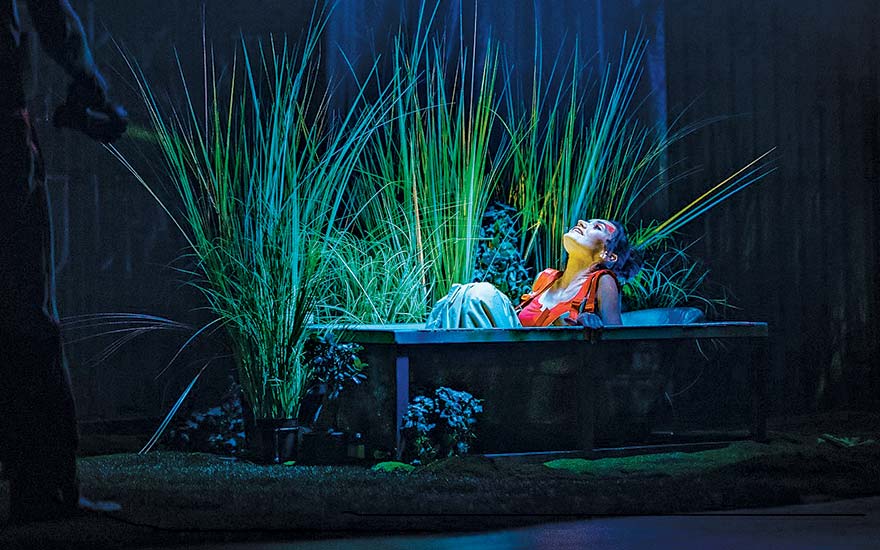As a strategic partner of the European Commission, the European Theatre Convention (ETC) offers European theatres an international programme, promoting contemporary theatrical creation and supporting emerging artists
Theatre is one of the most widespread art forms in Europe. It has been the cultural sector’s most traditional and liveliest form of expression and human values for the past 2,500 years. Based on live intermediate interaction, language diversity and literature, the sector contributes significantly to Europe’s cultural and linguistic diversity. In our current political times, when freedom of expression – in particular in the theatre – is often challenged in many member states and the European project is brought into question by nationalist and extremist movements, we need to reinforce a pluralistic and democratic culture, bridging cultures and languages, interacting with neighbours and others to encourage dialogue. Theatre allows us to do this, as an art form and in its public spaces, says ETC Executive Director Heidi Wiley, speaking in this exclusive interview for CorD.
Ms Wiley, could you please tell us what the European Theatre Convention represents and how the need arose for it to be founded?
It was more than thirty years ago that three theatres in France, Belgium and Germany connected to establish closer ties for collaboration across borders, to exchange performances and co-produce new theatrical works. This was before the Iron Curtain fell, and it arose out of a desire to formalise existing relations between artists and theatres; for the theatre to manifest its important role within a community in bridging the gaps between cultures and countries.
How many members does your network bring together, and what types of support and networking do you offer them?
Soon after the fall of the Berlin Wall, many theatres from the former Eastern Europe, as well as the rest of Western Europe, joined the European Theatre Convention (ETC), and it has today grown into an arts organisation that represents public theatres from nearly 30 countries. As a strategic partner of the European Commission, the ETC offers European theatres an international programme, promoting contemporary theatrical creation and supporting emerging artists.

ETC’s season programme, ENGAGE, has a focus on developing theatre practises that enlarge and widen audience participation, through youth, participatory and digital theatre works. We jointly initiated new international activity in those fields, through projects such as Young Europe, Our Stage and the European Theatre Lab, and we shared our research and experience via workshops, festivals and publications. ETC organises international theatre conferences twice a year that are open to members and non-members and address burning issues connecting society and the theatre through creative dialogue. Our next conference, taking place from 25th to 27th November, is dedicated to green theatre and sustainability.
Since the lockdown began, our online networking programmes – such as the online Coffee Break for members – helped us to continue exchanges of activities, ideas and concepts, keeping international contacts alive. The ETC also offers various grant programmes to support the work of its member theatres and individual artists seeking to pursue a career at the international level.
Soon after the fall of the Berlin Wall, many theatres from the former Eastern Europe, as well as the rest of Western Europe, joined the European Theatre Convention (ETC), and it has today grown into an arts organisation that represents public theatres from nearly 30 countries
The European Commission announced the launch of the European Theatre Initiative at the beginning of November, pledging to provide more strategic European support to theatres and the performing arts. Could you tell us more about this?
Theatre is one of the largest art forms in Europe. For 2,500 years it has been the most traditional and liveliest form of expression, of human values, in the cultural sector. Based on live intermediate interaction language diversity and literature, the sector contributes significantly to Europe’s cultural and linguistic diversity. In our current political times, when freedom of expression – in particular in the theatre – is often challenged in many member states and the European project is brought into question by nationalist and extremist movements, we need to reinforce a pluralistic and democratic culture, bridging cultures and languages, interacting with neighbours and others to encourage dialogue. Theatre allows us to do this, as an art form and in its public spaces.
The European Commission’s European Theatre Initiative has recognised the important value of theatre and created a strategic framework to address the most pressing challenges confronting the sector. With the recent European Theatre Forum, a sector-based policy dialogue has been launched. A second measure of the Initiative is the recently launched study to gather data on the situation of European theatres. On the basis of that information, more targeted sector-based support for theatre and performing arts will be created in scope of the Creative Europe Programme, in order to make theatre’s position as a key European art form visible, recognised and represented in Europe and worldwide, and to act as a revival response to the devastating impact of the COVID-19 pandemic on the sector.

In accordance with this, the European Theatre Forum was held from 11th-13th November with the aim of creating a dialogue between representatives of theatres and performing arts and policymakers. What were the conclusions of this forum?
The Forum was the first gathering of theatre representatives and policymakers from all European countries and even beyond. In other industries, such as music or film, these dialogues and professional connections have existed for many years. As such, this Forum was quite powerful and brought together, for the first time, representatives of the largely fragmented theatre and performing arts sector, public institutions, individual companies and freelancers, festivals, independent production houses and academies, speaking for the first time with a unified voice in dialogue with policymakers.
A Consortium of twelve theatre and performing arts organisation worked for seven months to identify the key issues to be discussed in the forum’s programme and formulated the Dresden Declaration. This paper stipulates the values, challenges and way forward for the theatre and performing arts in Europe, pointing out eight concrete areas of action. It concludes the next steps for a continuous dialogue and support for the sector, in order to overcome the pandemic’s devastating impact and ensure the sector thrives. It stresses the importance of pan-European sectoral collaboration – which is about learning from and about each other, creating a strong common voice and enhancing the policy dialogue – to be continued, deepened and elevated to the next level. And it calls for a follow-up to the current sector-based and policy dialogue with the organising of the second European Theatre Forum in 2021 and the setting up of an EU support strand focused on the theatre and performing arts.
We know the importance of theatre for our lives and communities, but also with a view to its enormous benefits in contributing to a sustainable culture, to social and economic growth and – last but not least – to the well-being of our citizens
How important is it that European theatres now have their own collective political voice?
The pandemic has shown – from one day to the next – that it is possible to shutdown all theatres, to stop all of our activities, to stop international collaboration in Europe and around the world. In other words, if our raison d’être can be taken away from one day to the next, it is very important to have a collective political voice in today’s society, to remain visible and relevant. At the national level, but also very much at the European level. Theatre is fundamental to our society. Beyond entertainment, it also has a strong educational purpose, provoking our thoughts, our critical thinking and our social dialogue. Discussions about systemically relevant sectors haven’t only demonstrated that it is important that we live, but also how we live. And the theatre is vital in ensuring part of this latter quality.

Why is it important to preserve theatres during the period of the Coronavirus pandemic, when work has been limited in many European countries? How important is it to maintain their work during a period of restricted freedoms?
As with everything else in life, if you destroy or banish something, it disappears. Structures and relations will dissolve. Rebuilding those takes much longer and more effort than saving and fostering them. We know the importance of theatre for our lives and communities, but also with a view to its enormous benefits in contributing to a sustainable culture, to social and economic growth and – last but not least – to the well-being of our citizens. Healthcare concepts have been developed to allow performances and rehearsals to continue. By taking all the measures necessary to prevent the virus from spreading, theatres offer safe and regulated environments for our audiences to engage.
It was a very strong signal when the National Theatre in Belgrade joined the ETC in June 2020, at a time when all theatres in Europe were under lockdown. This theatre joined us during our last conference, entitled ‘Reopening European Theatres’
The National Theatre in Belgrade is also a member of the European Theatre Convention. What are the most common projects in which cooperation unfolds?
It was a very strong signal when the National Theatre in Belgrade joined the ETC in June 2020, at a time when all theatres in Europe were under lockdown. This theatre joined us during our last conference, entitled ‘Reopening European Theatres’, which concluded with a European campaign to lobby for the arts in Europe to save and support theatres. Those conferences have been, and continue to be – alongside our virtual meetings – a decisive juncture for our community to join forces and elaborate joint projects and joint visions.
The ETC European Theatre Academy, ETC’s masterclass for international collaboration in theatres, took place in June. Initially intended to be held at the Festival d’Avignon, this year it was also virtual – and included the participation of the National Theatre in Belgrade. Contemporary theatre creation lies at the heart of ETC collaboration, as well as a desire to bring new viewpoints and perspectives from other parts of Europe into each other’s programmes. It is there to introduce new artistic voices and different forms of expressions, to use theatrical collaboration to expand our audiences’ horizons in the various communities in which ETC member theatres are based.